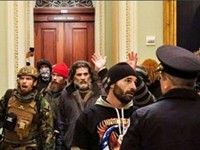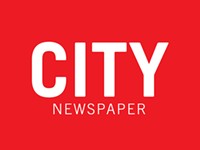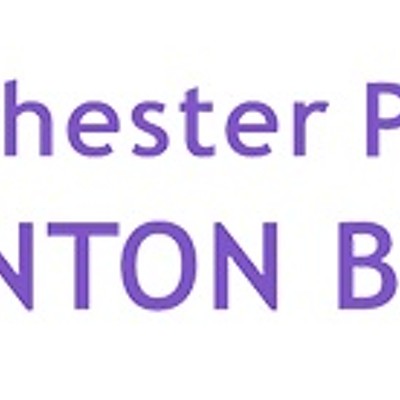[
{
"name": "500x250 Ad",
"insertPoint": "5",
"component": "15667920",
"parentWrapperClass": "",
"requiredCountToDisplay": "1"
}
]
How should we respond to the horrific assault on the French weekly Charlie Hebdo?
National security, national-security excesses, bigotry, immigration, the poverty and alienation in immigrant communities: last week's tragedy gives us plenty to talk about.
And for many journalists, cartoonists, and their publications, the murders have led to an intense debate about a more personal, crucial issue: how we show our support both for Charlie Hebdo and its devastated staff and for the right of freedom of expression.
One response has been to reprint several of the Charlie cartoons. But some publications have been strangely selective, publishing fairly innocuous images that didn't contain images of Muhammad, and it's those images that the killers said were offensive.
Others have published Charlie cartoons that mock Muhammad and Islam, arguing that we can't speak out adequately for free speech and against the murders at Charlie Hebdo unless we do.
And some publications are refraining from publishing any of the Charlie cartoons. We're among the latter.
Our reason: to portray Charlie Hebdo accurately and fairly, we would have to show examples of the breadth of its work, including the most shocking. Our policy is to not publish material intended to mock people or their religious faith. We wouldn't have published Charlie's most offensive cartoons prior to the slaughter, and showing our support for free speech doesn't require us to publish them now. (And to do so, I think, is more than a bit self-congratulatory.)
I've looked at a fair number of Charlie Hebdo's cartoons. Some are excellent, powerful satire. Some - to me, at least - are hilarious skewers of celebrities. Among them: a 2009 sketch of a stark white skeleton with ghoulish face and straight black hair. The headline: "Michael Jackson, Finally White."
But some are harshly bigoted and would fit right in on a white-supremacist website. One example, which Glenn Greenwald cited on The Intercept: "the one mocking the African sex slaves of Boko Haram as welfare queens." Others seem pointlessly insulting, sophomoric, offensive merely for the sake of being offensive: pornographic poses of Muhammad and the pope, for instance.
And while Charlie Hebdo was known for attacking all religions, Islam was a frequent target. There's a difference, Yale professor Jason Stanley noted on the Times' website, "between mocking a Catholic pope and Muhammad."
"The pope is the representative of the dominant traditional religion of the majority of French citizens," said Stanley. "The Prophet Muhammad is the revered figure of an oppressed minority. To mock the pope is to thumb one's nose at a genuine authority, an authority of the majority. To mock the Prophet Muhammad is to add insult to abuse."
Immigration is a major controversy in France, as in the United States, and France's growing Muslim population is often poor and ostracized. Cartoons with bigoted undertones can fuel the anti-Muslim fire.
"Je ne suis pas Charlie," wrote syndicated columnist Clarence Page. "I am not Charlie, although they have my sympathies and support." Page said he defended the publication's right to publish whatever it chooses. "But," he said, "I would be remiss if I failed to condemn its racism - as well as its sexism, its anti-theism, and attacks against other targets that were in much less privileged positions to defend themselves."
"The legal right to free speech requires that people's right to speak freely be respected legally," Matthew Yglesias wrote on Vox. "That means no legal sanction for publishing racist cartoons if you choose to publish them, and it means that the law must protect you from acts of retaliatory violence. But defense of the right does not in the slightest bit entail defense of the practice. You shouldn't publish racist cartoons! That's not free speech, that's politeness and common human decency."
"When we find ourselves feeling the need to valorize the courage of scabrous, offensive cartoons in order to affirm the right of their publication," Yglesias said, "we are operating in a framework made by terrorists."
"The fact of the matter is that racist and Islamophobic attitudes are a huge problem in the everyday lives of Europe's Muslim population," he wrote. "Far-right political parties are on the rise, and mainstream parties are moving to co-opt their agendas. Blasphemous, mocking images cause pain in marginalized communities. The elevation of such images to a point of high principle will increase the burdens on those minority groups."
Interviewed on NPR's Morning Edition last week, Majid Messaoudene, a councilmember in a predominantly Muslim suburb of Paris, expressed sadness for the deaths at Charlie Hebdo, two of whose staff members he knew. But he also drew attention to the fear under which Muslims in France live, and to the anti-Muslim sentiment in that country.
Messaoudene said while he had never wanted the Charlie Hebdo staff to be censored, he had urged friends on the staff to understand what Muslims experience. "I think that you can't draw the prophet knowing that, for the Muslims, the huge insult this can do," he said, "without thinking in the context you are living in."
He had told Stephane Charbonnier, Charlie Hebdo's editor, he said, "that he could not do whatever he wanted to do without taking into account" what Muslims in France were facing.
"Muslim people that I know," said Messaoudene, "they are afraid. They are afraid to live in such a violent world and such a difficult world for the Muslim people."
"Free speech allows us to say hateful, idiotic things without being punished by the government," Jordan Weissmann wrote on Slate. "But embracing that right means that we need to acknowledge when work is hateful or idiotic, and can't be defended on its own terms."
What does it accomplish to insult Muslims who are as horrified of the killings in France as non-Muslims are? Does standing up for free speech and expressing solidarity with Charlie Hebdo require that insult? Or are we publishing the cartoons just because we can?
Some critics' argument to the contrary, not publishing the cartoons isn't giving in to the terrorists. It's sticking to our principles.
Speaking of...
-

Rochester man faces federal charges in U.S. Capitol rioting
Jan 15, 2021 -

Trump's Riyadh speech and the roots of terrorism
May 31, 2017 -

Trump’s fact-free nation and democracy’s future
Feb 28, 2017 - More »
Latest in Urban Journal
More by Mary Anna Towler
-

Police reform: advocates on what should come next
Oct 22, 2019 -

Court clears the way for Police Accountability referendum
Oct 17, 2019 -

Dade outlines initial actions on district deficit
Oct 9, 2019 - More »





